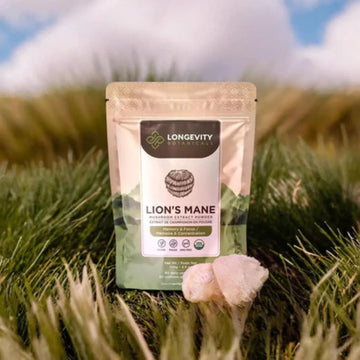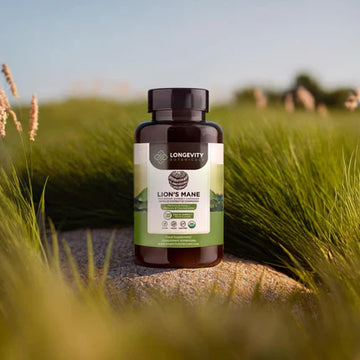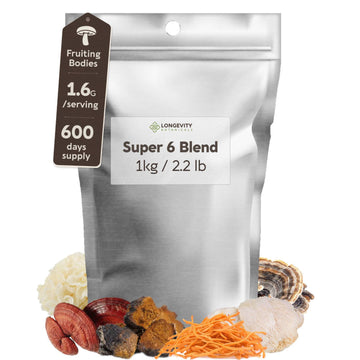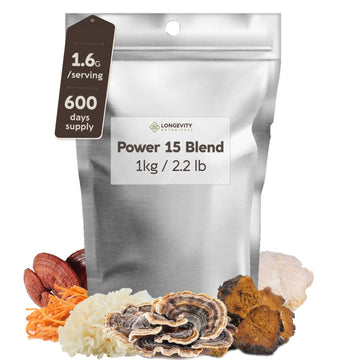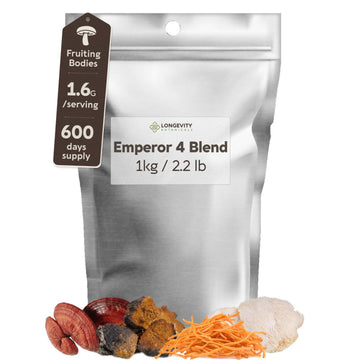Cordyceps and ashwagandha are two popular herbs with unique benefits. Both are adaptogenic herbs that can help the body manage stress, but they have different effects and uses.
Cordyceps is a type of fungus that grows on caterpillars. It may boost energy and athletic performance. Some studies suggest it can improve oxygen use during exercise. Cordyceps also contains B vitamins and may support immune function.
Ashwagandha, on the other hand, is an herb used in Ayurvedic medicine for centuries. It's known for its calming effects and ability to lower stress levels. Research indicates ashwagandha may help reduce anxiety and improve sleep quality. Longevity Botanicals offers high-quality cordyceps supplements for those interested in trying this mushroom.
What Are Cordyceps and Ashwagandha?
Understanding Cordyceps: The Powerful Adaptogenic Mushroom
Cordyceps is a genus of parasitic fungi that grows on insect larvae. The two main species used in supplements are Cordyceps sinensis and Cordyceps militaris. Traditionally found on the Tibetan Plateau, cordyceps has been used in Chinese medicine for centuries.
Cordyceps contains bioactive compounds that may support:
- Energy production
- Oxygen utilization
- Athletic performance
Research suggests cordyceps may improve aerobic capacity and endurance. Some studies indicate it could enhance recovery after intense exercise.
Exploring Ashwagandha: The Ancient Ayurvedic Herb
Ashwagandha is a small shrub native to India and North Africa. Its root has been used in Ayurvedic medicine for over 3,000 years. The herb's name means "smell of the horse" in Sanskrit, referring to its distinct odor and potential to impart strength.
Key components of ashwagandha include:
- Withanolides (steroidal lactones)
- Alkaloids
- Saponins
These compounds contribute to ashwagandha's adaptogenic properties. The herb may help:
- Reduce stress and anxiety
- Improve sleep quality
- Support cognitive function
Some studies suggest ashwagandha could enhance strength and muscle recovery in athletes.
What Are the Key Health Benefits of Cordyceps?

Boosting Energy and Athletic Performance
Cordyceps can increase energy levels and improve athletic performance. The mushroom helps the body use oxygen more efficiently, which can enhance stamina and endurance. This can lead to better workout results and faster recovery times.
Studies show cordyceps may increase the production of ATP, the main energy source for cells. This can reduce fatigue during exercise and daily activities.
Athletes who take cordyceps supplements often report feeling less tired after intense training sessions. The mushroom's energy-boosting effects may be especially helpful for endurance sports like running or cycling.
Supporting Immune Function
These mushrooms have both anti-inflammatory and antioxidant properties.
The fungi may help the body fight off harmful bacteria and viruses. They can also reduce inflammation throughout the body, which is linked to many health problems.
Cordyceps might increase the production of certain immune cells. This can help the body respond more quickly to infections and other threats.
Some studies suggest cordyceps could be useful for people with weakened immune systems. However, more research is needed to fully understand these effects.
Potential Anti-Aging Properties
Cordyceps may have anti-aging benefits for the body and brain. The mushrooms contain antioxidants that can protect cells from damage caused by free radicals.
These fungi might help improve memory and cognitive function in older adults. Some research shows they could protect brain cells from age-related decline.
Cordyceps may also support heart health by helping to lower cholesterol levels. This can reduce the risk of heart disease as people age.
The mushrooms' anti-inflammatory effects could help prevent or manage age-related conditions like arthritis.
What Are the Main Health Benefits of Ashwagandha?

Ashwagandha offers several health benefits backed by scientific research. This herb can help with stress, sleep, and brain function.
Stress Reduction and Anxiety Management
Ashwagandha may lower cortisol levels in the body. Cortisol is a hormone linked to stress. By reducing cortisol, ashwagandha can ease stress and anxiety.
Studies show that people who take ashwagandha feel calmer. They report less stress and worry in their daily lives.
The herb works by affecting the nervous system. It helps the body respond better to stress. This can lead to a more relaxed state of mind.
Ashwagandha is part of Ayurvedic medicine. It has been used for centuries to promote relaxation. Modern research supports its use for stress relief.
Improving Sleep Quality
Ashwagandha may help people sleep better. It can make it easier to fall asleep and stay asleep through the night.
The herb affects brain chemicals that control sleep. It may increase the amount of deep sleep a person gets. Deep sleep is important for feeling rested.
People who take ashwagandha often report waking up feeling more refreshed. They have more energy during the day.
Better sleep can improve mood and reduce stress. This creates a positive cycle, as less stress also leads to better sleep.
Enhancing Cognitive Function
Ashwagandha might boost brain health and memory. It has neuroprotective properties that can shield brain cells from damage.
Studies suggest the herb may improve:
- Attention
- Information processing speed
- Task performance
These benefits can help with daily mental tasks. Students and workers may find it easier to focus and remember information.
Ashwagandha's effect on stress also helps the brain. Less stress can lead to clearer thinking and better decision-making.
Ashwagandha's immune benefits often come from its stress-reducing properties. Lowering stress may help prevent the immune suppression that can occur with chronic stress.
Cordyceps might be more effective for acute immune support. For long-term immune health, especially in stress-prone individuals, ashwagandha could be the better choice.
How Can You Incorporate Cordyceps and Ashwagandha into Your Wellness Routine?
Adding cordyceps and ashwagandha to your daily habits can boost energy and reduce stress. These herbs offer different benefits that work well together.
Combining Cordyceps and Ashwagandha: Is It Beneficial?
Mixing cordyceps and ashwagandha can create a powerful wellness combo. Cordyceps may increase energy and stamina, while ashwagandha helps manage stress. Together, they can support both physical and mental well-being.
To use these herbs:
- Take them as supplements in powder or capsule form
- Mix powders into smoothies
- Use them at different times of day for best results
For example, try cordyceps in the morning for an energy boost. Take ashwagandha in the evening to promote restful sleep.
Start with small doses and increase slowly. This allows the body to adjust and helps avoid side effects. Always check with a doctor before adding new supplements, especially if taking medications.
Longevity Botanicals offers high-quality mushroom powders that make it easy to add these herbs to your routine. Consistent use over time often leads to the best results.
Which Adaptogen Is Right for You: Cordyceps or Ashwagandha?
Energy levels play a big role in picking between cordyceps and ashwagandha. Cordyceps may help boost stamina and athletic performance. It could be good for people who want more energy during workouts or busy days.
Ashwagandha might work better for stress relief and sleep. It can help calm the mind and body. This makes it useful for those dealing with anxiety or insomnia.
Both herbs may support heart health. Cordyceps might improve blood flow. Ashwagandha could help lower blood pressure and cholesterol.
For digestive health, ashwagandha may reduce inflammation in the gut. Cordyceps doesn't have strong effects on digestion.
Libido support varies between the two. Ashwagandha might boost sex drive in both men and women. Cordyceps may help with male sexual function.
When to Use Cordyceps vs. Ashwagandha
Use cordyceps when:
- You need an energy boost
- You want to improve exercise performance
- You're looking to enhance lung function
Try ashwagandha when:
- You're dealing with high stress
- You have trouble sleeping
- You want to lower anxiety
For some, taking both herbs together works well. This combo can offer a balance of energy and calm.
Can you take cordyceps and ashwagandha together safely?
Yes, cordyceps and ashwagandha can be taken together safely. These herbs have different mechanisms of action and can complement each other. Many people use them in combination for enhanced benefits.
It's always best to start with low doses and monitor your body's response. Consult a healthcare professional before combining supplements, especially if you have any health conditions or take medications.
How does ashwagandha impact energy levels in comparison to cordyceps?
Ashwagandha and cordyceps affect energy levels differently. Ashwagandha tends to have a more balancing effect on energy. It can help reduce fatigue and increase stamina over time by lowering stress levels.
Cordyceps, in contrast, often provides a more noticeable boost in energy and endurance. It may be more suitable for pre-workout or when quick energy is needed. Both herbs can support overall vitality, but cordyceps is typically more stimulating.
